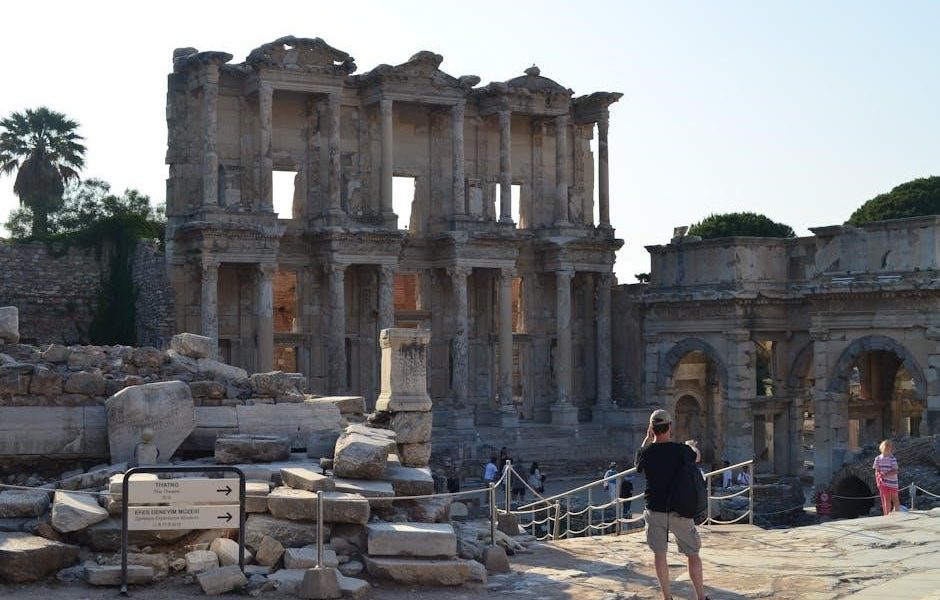Ironman Mode offers a challenging, self-sufficient experience in OSRS, restricting trades and requiring players to manage their economy and resources independently․ It provides a unique gameplay experience compared to regular accounts, emphasizing skill progression and strategic planning without external assistance․
1․1 What is an Ironman Account?
An Ironman account in OSRS is a self-sufficient mode where players cannot trade with others or use the Grand Exchange․ Designed for experienced players, it offers three modes: Ironman, Hardcore Ironman, and Ultimate Ironman․ These accounts require meticulous resource management and strategic planning, as all progress must be earned independently․ The Ultimate Ironman mode adds an extra challenge by removing bank access, forcing players to carry essential items at all times․ This mode is ideal for those seeking a more challenging and rewarding experience․
1․2 Differences from Regular Accounts
Ironman accounts differ significantly from regular accounts by restricting trades, Grand Exchange usage, and player interactions․ Players must rely solely on their skills and resources, making progression entirely self-sufficient․ Ultimate Ironman adds the challenge of no bank access, requiring careful inventory management․ These restrictions create a more immersive and challenging experience, appealing to players who enjoy strategic planning and independence in their gameplay․
1․3 Benefits and Challenges of Ironman Mode
Ironman Mode offers a rewarding experience by fostering self-sufficiency and strategic planning․ It encourages efficient skill progression and resource management, providing a sense of accomplishment through solo achievements․ However, it also presents challenges like limited access to resources and the need for careful inventory management․ The mode appeals to players seeking a more immersive and challenging journey, where every decision impacts progress․ This unique experience is ideal for those who enjoy overcoming adversity through careful planning and dedication․
Choosing the Right Ironman Mode
OSRS offers three Ironman modes: Standard, Hardcore, and Ultimate․ Each mode varies in difficulty and restrictions, catering to different playstyles․ Choose wisely based on your preferences and skill level for an optimal experience․
2․1 Overview of Ironman, Hardcore Ironman, and Ultimate Ironman
OSRS offers three distinct Ironman modes, each with unique challenges; Standard Ironman restricts trading and Grand Exchange use, while Hardcore Ironman adds perma-death upon defeat․ Ultimate Ironman combines these restrictions and removes bank access, requiring players to manage inventory meticulously․ Each mode caters to different playstyles, offering varying levels of difficulty and complexity for players seeking a self-sufficient adventure․
2․2 Tips for Selecting the Best Mode for Your Playstyle
Choose your Ironman mode based on skill level and preference․ For casual players, standard Ironman offers a balanced challenge․ Hardcore Ironman suits experienced players seeking high-risk rewards, while Ultimate Ironman is for those who enjoy extreme difficulty and inventory management․ Assess your playstyle, time commitment, and desired challenge level to pick the mode that aligns with your goals and provides the most enjoyment․

Starting Your Ironman Journey
Embark on your Ironman adventure by creating a dedicated account and understanding the unique challenges․ Begin with essential gear and quests to set the foundation for your journey․
3․1 Creating and Setting Up Your Ironman Account
Creating an Ironman account in OSRS involves selecting the Ironman mode during account setup․ Choose from Ironman, Hardcore Ironman, or Ultimate Ironman based on your preference for difficulty and restrictions․ Once created, your account will be locked from trading with other players and accessing the Grand Exchange․ Start by completing early quests and gathering essential items like food, weapons, and armor․ Talk to Adam or Paul in Lumbridge for guidance․ Use this period to familiarize yourself with the game mechanics and plan your progression carefully․ For new players, using a guide like OzirisLoL’s can help navigate the early stages efficiently․ Focus on self-sufficiency, as you cannot rely on others for resources․ Crafting, monster drops, and skill-based activities will be your primary sources of income․ Time management and prioritization are key to thriving in Ironman Mode, so ensure you have a well-planned strategy from the start․
3․2 Essential Starter Gear and Items
Starting your Ironman journey requires gathering essential gear and items to ensure survival and early progression․ Equip basic weapons like a bronze sword and shield, along with leather or steel armor․ Carry a pickaxe for mining, an axe for chopping wood, and fishing gear for food․ Stock up on healing items like lobsters, trout, and potions․ Craft or obtain a crisis shield and anti-dragon shield for protection․ Don’t forget a needle, thread, and early potion ingredients like guam and eye of newt․ These items will help you navigate the early game effectively․

Skill Progression and Efficiency
Maximizing skill progression as an Ironman requires strategic planning․ Prioritize quests offering early skill boosts, such as Shadow of the Storm for Ranged and Death to the Dorgeshuun for agility․ Focus on efficient leveling paths, optimizing training spots, and utilizing the best gear available to minimize waste and accelerate growth․
4․1 Quests for Early Skill Boosts
Quests are crucial for early skill progression in Ironman Mode․ Shadow of the Storm offers 10,000 combat experience, bypassing early Ranged levels․ Death to the Dorgeshuun and Horror from the Deep grant significant Ranged experience, enabling quick progression to higher levels․ Completing these quests early ensures efficient skill growth without excessive grinding, saving time and resources for other essential activities in your Ironman journey․
4․2 Efficient Leveling Paths for Key Skills
Focus on skill-specific leveling paths to maximize efficiency․ For Ranged, start with the shortbow and progress to better bows as you level․ Train at chickens or cows for early levels, then transition to more rewarding targets like yaks or dragons․ Agility can be trained at Draynor Village or Canifis for faster experience․ Herblore benefits from quest rewards like Druidic Ritual and crafting potions․ Prioritize skills that unlock essential items or bonuses to streamline your progression and minimize downtime․

Making Money as an Ironman
Generate coins through crafting, monster drops, and other profitable activities․ Crafting allows creating valuable items, while monster drops provide rare resources․ These methods ensure self-sufficiency and growth․
5․1 Best Methods for Generating Coins
Ironmen can generate coins through crafting, monster drops, and flipping items․ Crafting herbs, potions, and jewelry offers consistent profits․ Monster drops from bosses like Zulrah or Barrows yield valuable items․ Additionally, flipping items like logs, herbs, or ores can provide substantial returns․ These methods ensure a steady income and allow players to grow their wealth independently․ Each activity requires strategic planning to maximize efficiency and profitability in the self-sufficient Ironman economy․
5․2 Crafting, Monster Drops, and Other Profitable Activities
Crafting is a reliable method for generating coins, with high-demand items like potions, jewelry, and bows․ Monster drops from bosses such as Zulrah or Barrows can yield valuable gear and resources․ Additionally, flipping items like logs, herbs, or ores through price fluctuations can be profitable․ These activities, combined with efficient inventory management, ensure a sustainable income stream for Ironmen, enabling them to thrive independently without relying on external resources or trades․

Equipment and Gear Progression
Equipment progression is crucial for Ironmen, requiring strategic planning to upgrade gear efficiently․ Early-game items like bronze weapons evolve into mid-game steel and mithril gear, eventually leading to late-game optimizations for high-level content and boss battles․ This journey ensures consistent power growth, enabling players to tackle tougher challenges and maintain competitiveness․ Crafting and monster drops are key to acquiring essential upgrades, making every piece of gear hard-earned and valuable;
6․1 Early-Game Gear to Mid-Game Upgrades
Ironmen begin with basic gear like bronze weapons and armor, progressing to steel and mithril as they complete early quests and defeat monsters․ Crafting plays a key role, with items like the mithril bar, obtained from chaos dwarves, aiding in upgrades․ Efficiently managing resources ensures smooth transitions, such as replacing the silver sickle with better tools․ This structured progression is vital for tackling mid-game content, ensuring readiness for higher-level challenges without relying on external assistance․
6․2 Endgame Gear and Optimization
Acquiring endgame gear as an Ironman requires meticulous planning and resource management․ High-level items like the twisted bow or dragon claws demand specific strategies, such as crafting or monster drops․ Optimizing armor sets for PvM or skilling ensures efficiency․ Players must balance gear upgrades with resource availability, avoiding reliance on the Grand Exchange․ Strategic decisions, like crafting or drop hunting, are crucial for endgame success, making every item hard-earned and valuable․

PvM and High-Level Content
Ironmen face unique challenges in PvM, requiring meticulous preparation and inventory management․ Strategic gear choices and efficient routes are essential for tackling high-level bosses and content effectively․
7․1 Preparing for PvM as an Ironman
Preparing for PvM as an Ironman requires meticulous planning, focusing on optimal gear, potions, and inventory management․ Ensuring high-level equipment, sufficient supplies, and a well-organized bank are crucial․ Players must also prioritize quest completion to unlock essential items and bonuses․ Efficient use of resources and strategic decision-making are vital to overcome challenges without external support․ Proper preparation enhances survival and success in high-level content․
7․2 High-Level Bosses and Efficient Strategies
High-level bosses in OSRS require tailored strategies and optimal gear to maximize efficiency․ For instance, Zulrah demands precise timing and anti-venom preparation, while Vorkath benefits from high-healing food and specific weapon setups․ Efficient strategies often involve understanding boss mechanics, such as attack patterns and safe spots, to minimize damage taken․ Practicing these encounters and adapting gear setups based on the boss ensures better success rates and resource conservation, which are critical for Ironman players․

Optimizing Your Gameplay
Optimizing gameplay involves efficient inventory management, using bank alternatives, and leveraging Runelite plugins to streamline tasks and enhance productivity, ensuring a smoother Ironman experience overall․
8․1 Inventory Management and Bank Alternatives
Effective inventory management is crucial for Ironmen, as bank access is limited․ Players must strategically organize items, prioritize essentials, and use alternative storage methods like player-owned houses or chests․ Utilizing teleportation tabs and item placeholders can maximize space․ Bank alternatives, such as the Magic Wardrobe or portable storage, also help reduce clutter and streamline gameplay, ensuring efficiency in quests and daily activities without compromising progress․
8․2 Using Runelite Plugins for Efficiency
Runelite plugins are essential tools for Ironmen, enhancing gameplay efficiency․ Plugins like inventory tags, quest trackers, and loot simulators help optimize decisions․ The bank tags plugin organizes items, while the achievement diary tracker monitors progress․ External tools like the OSRS Wiki integration provide quick access to quest and skill guides․ These plugins streamline gameplay, reduce wasted time, and improve overall efficiency, making them indispensable for Ironman success in OSRS․

Advanced Tips and Tricks
Optimize quest completion by prioritizing those that grant multiple skill bonuses, reducing redundant leveling․ Efficiently manage inventory space to minimize bank trips and maximize resource utilization in OSRS Ironman Mode․
9․1 Time Management and Prioritization
Effective time management is crucial for Ironman success․ Prioritize quests and skills that offer multiple benefits, like bonus experience or resource access․ Focus on high-impact activities such as efficient leveling paths and profitable money-making methods․ Balance skill progression with equipment upgrades to maintain momentum․ Use tools like Runelite plugins to track progress and optimize tasks․ Avoid wasting time on low-yield activities by planning ahead and setting clear goals for each session․ This ensures steady growth and long-term enjoyment․
9․2 Avoiding Common Mistakes
Avoiding common mistakes is essential for Ironman success․ Many players overlook the importance of prioritizing quests that unlock key skills or resources․ Poor inventory management and failing to optimize resource gathering can hinder progress․ Neglecting to use tools like Runelite plugins for efficiency is another frequent error․ Additionally, some players rush through content without proper preparation, leading to avoidable setbacks․ Staying organized and focused on long-term goals helps minimize these pitfalls and ensures a smoother journey․

Maintaining Motivation and Enjoyment
Ironman accounts cannot trade with others or use the Grand Exchange, requiring self-sufficiency in item acquisition․ This adds a challenging layer to gameplay, emphasizing personal achievement․
10․1 Setting Goals and Tracking Progress
Setting clear, achievable goals is crucial for maintaining motivation․ Break down larger objectives into smaller milestones, such as reaching a new skill level or completing a challenging quest․ Celebrate progress, no matter how minor, to stay encouraged․ Use in-game tools like quest journals or third-party apps to track your advancements․ Regularly reviewing your accomplishments helps reinforce a sense of achievement and keeps you focused on long-term goals․
10․2 Staying Engaged and Avoiding Burnout
To avoid burnout, mix activities like skill grinding, PvM, and quests to keep gameplay fresh․ Take regular breaks to recharge and maintain a healthy play schedule․ Celebrate small victories to stay motivated․ Experiment with new strategies or goals to keep things exciting․ Use tools like Runelite plugins to track progress without overwhelming yourself․ Remember, consistency is key—enjoy the journey and embrace the challenge of Ironman Mode to stay engaged long-term․



